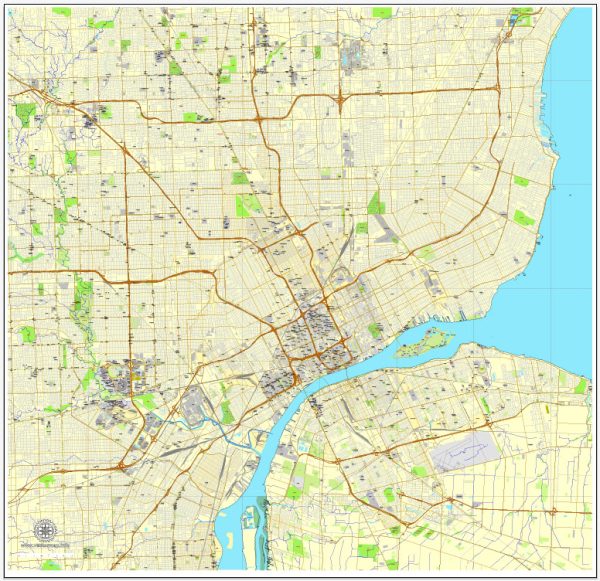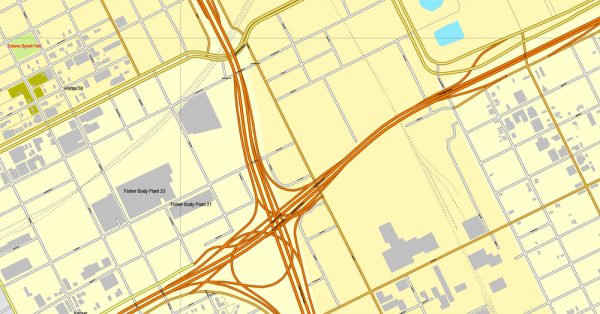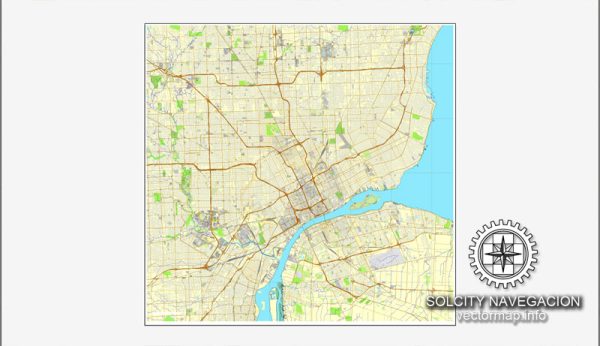Detroit, Michigan, has a rich and diverse history that has played a significant role in the development of the United States. Here is an overview of its history:
- Native American Settlements: Before European colonization, the Detroit area was inhabited by various Native American tribes, including the Huron, Potawatomi, and Ojibwa. The French explorer Antoine Laumet de La Mothe, sieur de Cadillac, founded Detroit in 1701 as a French fur trading post, Fort Pontchartrain du Détroit. The city’s name is derived from the French word “détroit,” which means strait, referring to its location on the Detroit River, connecting Lake Erie and Lake St. Clair.
- British Control: During the French and Indian War (1754-1763), the British gained control of Detroit, and it became a strategic military and trading post. The British maintained control until the American Revolutionary War when the United States took possession of the area in 1796 under the terms of the Jay Treaty.
- Early Growth and Industry: In the early 19th century, Detroit experienced significant growth and industrialization, primarily due to its location along the Great Lakes and the Erie Canal, which allowed for the easy transportation of goods. The city became known for manufacturing and transportation industries, with shipbuilding, lumber, and the fur trade playing important roles.
- The War of 1812: During the War of 1812, Detroit briefly fell back into British hands before being returned to the United States as a result of the Treaty of Ghent in 1814.
- Auto Industry: Detroit’s most significant historical influence came with the rise of the automobile industry. The city is often called the “Motor City” due to its association with major car manufacturers like Ford, General Motors, and Chrysler. The introduction of the assembly line by Henry Ford in 1913 revolutionized manufacturing and made Detroit a hub for automobile production.
- The Great Migration: In the early 20th century, Detroit attracted a significant African American population during the Great Migration, as people from the South moved north in search of better economic opportunities and to escape racial discrimination.
- Economic and Social Challenges: Detroit’s economy was closely tied to the auto industry, and the city faced economic challenges as the industry declined and manufacturing jobs moved elsewhere. This decline, coupled with social and political issues, led to a series of challenges, including urban decay, racial tensions, and financial difficulties.
- Decline and Bankruptcy: Detroit filed for bankruptcy in 2013, becoming the largest U.S. city to do so at that time. The bankruptcy was a culmination of years of financial mismanagement and population decline.
- Resurgence and Revitalization: In recent years, Detroit has been on a path to recovery. The city has seen a resurgence in downtown development, with new businesses, restaurants, and cultural attractions. Investments in infrastructure, education, and community revitalization have aimed to address some of the city’s long-standing issues.
- Cultural Contributions: Detroit has made significant contributions to American music, including the birth of Motown, a genre that produced numerous legendary artists. The city is also known for its rich cultural and artistic heritage, with world-class museums, theaters, and sporting events.
Detroit’s history is marked by its transformation from a French fur trading post to an industrial powerhouse, and eventually to a city grappling with economic and social challenges. Its past and present continue to shape the identity and future of this iconic American city.




 Author: Kirill Shrayber, Ph.D. FRGS
Author: Kirill Shrayber, Ph.D. FRGS